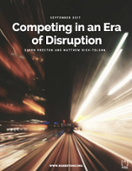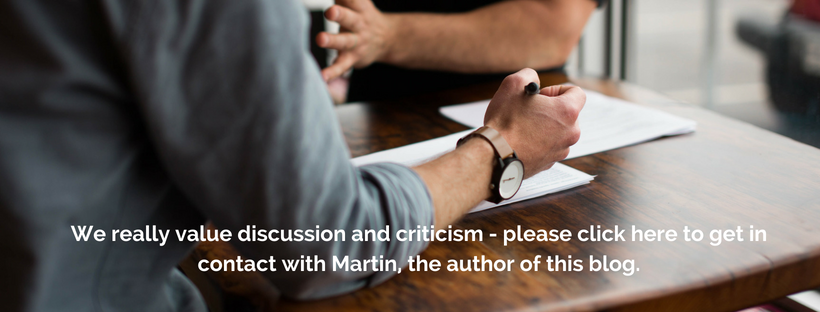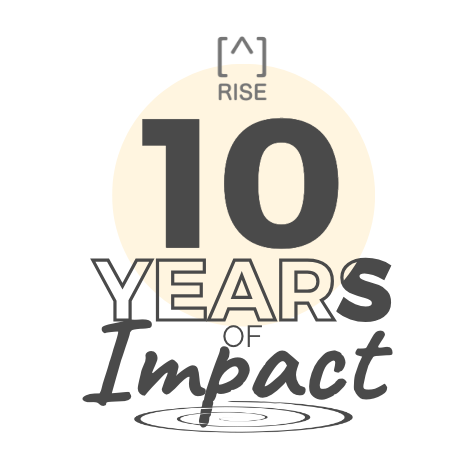Rapidly Changing Markets: A Classic Dilemma
“Learning and innovation go hand in hand. The arrogance of success is to think that what you did yesterday will be sufficient for tomorrow.”
Wise words from a transformational change guru? Not at all. William Pollard was a 19th century English clergyman, would you believe? Someone else who has an intrinsically modern understanding of that principle is Karl Micallef, CEO of Malta-based Classic Group Ltd, a jewellery group also operating in the retail industry specialising in luxury goods. “We’re a family-run company celebrating thirty years in business. We’ve won awards and been chosen to represent Malta in the International Business Awards more than once, yet our past success will count for nothing tomorrow, the way markets are changing so rapidly.”
.png?width=376&name=Untitled%20design%20(17).png)
He’s right to be concerned about the pace of change. It’s a position that many companies need to face up to globally. Companies may have performed well traditionally and their top teams may be reliable and dependable, technically sound and experts in their field, no doubt they know their business inside out. But how effective are they at sensing changing conditions? How fast are they - individually and collectively - to respond to market shifts and implement change? As technological innovation accelerates, success awaits those who are also agile and adaptable.
As the CEO of Classic Group, Karl recognises that to remain successful means facing up to future challenges. “We wanted to remain exclusively in the jewellery trade. So for us, diversification initially meant moving from wholesale to retail, then from retail to travel retail. We moved our product offering from traditional to high-end jewellery, mainly diamonds and then branded luxury watches. It was later that we moved into fashion jewellery and watches. Essentially we adopted a three dimensional approach to span the traditional sector, the exclusive and sophisticated market, and the more trendy, fashion conscious market segment. But the market is switching increasingly from niche luxury to more fashionable lines, requiring us to be faster.” The jewellery industry has seen a shift in the way consumers purchase and the reaction has been interesting. Karl sees that brands are now filling the space of the ‘middlemen’ themselves, creating more overall control and exploiting their understanding that, as niche businesses, they have enough margin to go direct. Consequently, Classic Group is now targeting their clients with a more diverse product offering whilst maintaining focus on their key retail expertise.
Yet despite the importance of detecting the shifts in their markets, Karl recognises that his real challenges are all about people. “I have to ensure that our top team is strong and can support the business effectively. And don’t forget, we’re privately owned so the family are key stakeholders - they need to be convinced too!”

Significantly, Karl has taken the decision to work with RISE because he believes that if his company is to develop and retain a competitive advantage in rapidly changing markets, they need an external perspective and expert help in changing culture and building capacity. “I have to be realistic about the future” says Karl. “I need to be a more effective team builder. Even then, we’ll have to pivot again in a few years. I believe we have good people who are technically excellent. But to stay ahead of the game, it’s critical for us to invest in our leadership and top of our requirements are agility and adaptability. Together we have to be confident that every one of our Management Group is picking up the signals in the market and responding intelligently. In effect, we want RISE to help us find some extra gears so that we can thrive whatever challenges the market throws at us.”
The RISE approach is to use their ‘Collaboration Framework’. “Our framework is more resilient and agile than traditional interventions”, says RISE Director Simon Preston. “We focus on enhancing the habits and practices of individuals whilst enabling the conditions for trust, common purpose and coherence at the organisational level."
What is Simon hoping to deliver for the Classic Group? “Firstly, have we got the right people in the room? Are they having the right conversations? Then it’s about increasing their capacity to learn - both from their own experiences and through a sharper understanding of the market.” The end-game for this phase is that the Management Group demonstrate the capability and flexibility to switch energy and resources quickly to whatever part of the business needs it most. For a traditional, hierarchical organisation this can be a tough ask.
.png?width=428&name=Untitled%20design%20(19).png) Upgrading the collaborative capacity of a management group is a must, but it doesn’t happen overnight. The RISE approach is to work with and alongside the whole CEO team and ensure that key steps are taken together. “This is about intensifying their connection to purpose” according to Simon. “Can we create a rhythm and a way of working that embeds virtuous cycles of learning?” Doesn’t that require positive relationships and engagement right across the organisation? “Absolutely! This is when our work becomes truly rewarding, building it out across all managers within the business. We want to see trust deepening and then we’ll see positive common habits and practices being developed and reinforced.”
Upgrading the collaborative capacity of a management group is a must, but it doesn’t happen overnight. The RISE approach is to work with and alongside the whole CEO team and ensure that key steps are taken together. “This is about intensifying their connection to purpose” according to Simon. “Can we create a rhythm and a way of working that embeds virtuous cycles of learning?” Doesn’t that require positive relationships and engagement right across the organisation? “Absolutely! This is when our work becomes truly rewarding, building it out across all managers within the business. We want to see trust deepening and then we’ll see positive common habits and practices being developed and reinforced.”
If the people in your company feel good about themselves, have a sense of ownership about what the business does and feel valued, they’re more likely to think creatively. That helps to breed resilience. The modern workplace is best seen as a community. Get it right and it can become a mentally and emotionally healthy place where people flourish and aren’t afraid to fail. In a world where disruption is inevitable, isn’t it best that you lead the disruption yourself?
To reassure Karl Micaleff that he’s doing the right thing, let’s finish with the words of Peter Marshall who, for good balance, was a Scottish clergyman…
“When we long for life without difficulties, remind us that oaks grow strong in contrary winds and diamonds are made under pressure.”
.png?width=120&height=120&name=RISE%20Logo%20(7).png)
%20(1).png?width=133&height=133&name=Compass%20Coasters%20(87%20x%2087%20cm)%20(1).png)


.png)

.png)